Have you ever thought about organizing your money? No, I don’t mean putting all of the $1’s together or facing the same direction. I mean budgeting. I don’t think a lot of people think that creating a budget is a form of organizing, but it sure is. Today, I’m going to help you create some organization surrounding your money.
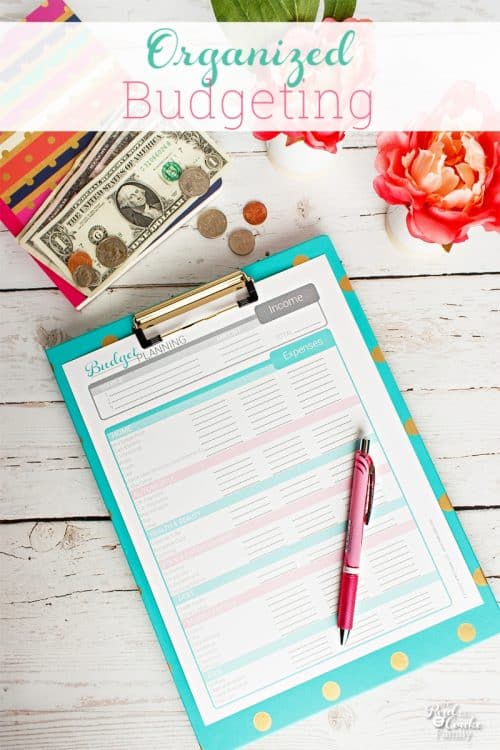 Creating a budget is something that can feel a bit overwhelming and to some people, it can feel like putting all kinds of restraints or limitations on your money. Let’s not look at it that way. You are a busy mom and budgeting is going to help you have a plan and organization for your money. This organization is meant to simplify your life and be a guide to help you get where you want to go. That creates security and peace in the long run.
Creating a budget is something that can feel a bit overwhelming and to some people, it can feel like putting all kinds of restraints or limitations on your money. Let’s not look at it that way. You are a busy mom and budgeting is going to help you have a plan and organization for your money. This organization is meant to simplify your life and be a guide to help you get where you want to go. That creates security and peace in the long run.
 This post is part of my #RealOrganized series. If you want the whole series, just click the graphic above or you can click here to sign up to have each week of this series and all the freebies directly emailed to you. The goal of this series is for you to be able to organize some of the things that as moms, we have to deal with on a yearly, monthly, weekly, or daily basis. By getting these things organized we can free up time in our week as well as space in our homes and minds. The main goal is to feel more organized and less clouded as moms so we can find time and space to spend with our family as well as do things we love and find fulfilling.
This post is part of my #RealOrganized series. If you want the whole series, just click the graphic above or you can click here to sign up to have each week of this series and all the freebies directly emailed to you. The goal of this series is for you to be able to organize some of the things that as moms, we have to deal with on a yearly, monthly, weekly, or daily basis. By getting these things organized we can free up time in our week as well as space in our homes and minds. The main goal is to feel more organized and less clouded as moms so we can find time and space to spend with our family as well as do things we love and find fulfilling.
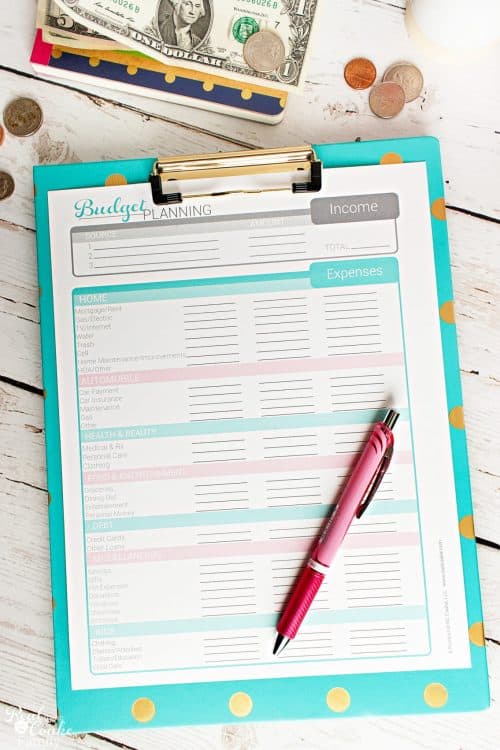
I’m going to keep it real, as I always do, for a minute before we get into how to create your budget.
I used to think budgets were dumb and totally like a prison. At that same time, I had tons of debt. Now, you know there was a total connection there, right? I wanted to be free to spend whatever I wanted, whenever I wanted. That was no way to organize my life and my money. It ended up creating a real prison for me. One where I had to work hard and most of what I earned went to pay back debt. Pretty dumb way to live, to me. Eventually, I got out of debt.
Then I got married and I wanted to stay home with our kids. A budget became a necessity and I became able to see it in a different way. I was able to see how a budget just was a tool or a way to organize our money in order for us to get what we wanted out of life. In this case, for me to stay home and for us to live on one income.
We again got into debt when my husband was unemployed for 9 months, but by using a budget, we have gotten ourselves out of debt, all while I stayed home with the kids. Now we have some savings and some retirement, not nearly what I would like or where I think we should be, but our budget is getting us there. The categories we have created over the years keep us on track. To keep it real, they sometimes do feel like a pain in the butt, but in the end, when I pay the bills each week, I so prefer the feeling of security and safety that knowing we have savings and retirement money. I love knowing that something breaks, we have money for that. It becomes worth it to me for that sense of safety and financial security.
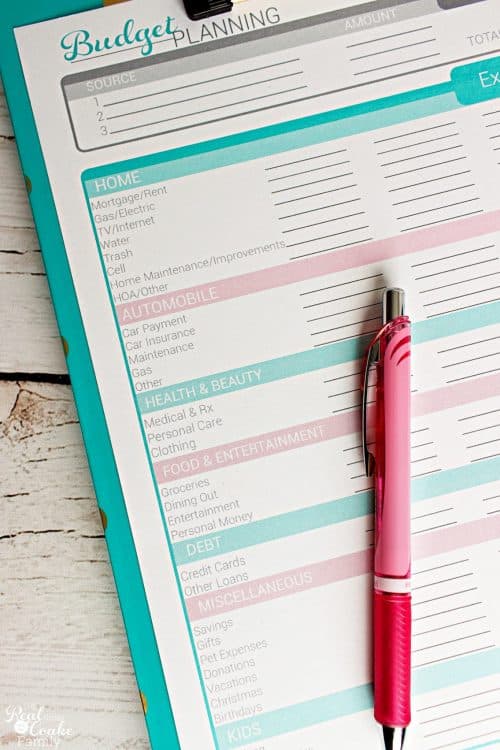
So, how do you create a budget?
I’ve got a couple of worksheets for you at the bottom of this post that will help you step by step.
If you don’t have a budget, start with the planning worksheet.
To create your budget you are going to need to track what you earn and what you spend for at least 1 month, but 2-3 is much better.
The planning worksheet has columns. They are meant for you to put down what you think you spend for a month in that category, then to put the actual amount you spend. Once you have those two numbers, subtract the difference. That just begins to give you a reality check as to what you truly spend in the various areas versus what you think you spend. Often we are VERY off.
When you have done this for 2-3 months, you will get an idea of what you are spending. It can be eye opening. There may be some habits and things you are spending money on that you don’t realize how much they add up to in a month. $5 for a sandwich on a work day doesn’t sound too bad, but if you do that every work day for the whole month it is $100. If you have goals of getting out of debt or saving or adding to retirement funds, those types of habits may need to be curbed or dropped to a few times a week in order to reach the goals you have for your money and family.
Is it worth the sandwich every day, but there are no vacations because both you and your husband are spending $100 a month on lunch at work? Maybe cutting that in half equals a great vacation for the family. It is putting this kind of thought into where your money goes that can make a big difference in enjoying the money you have.
I think often we are just getting through the day and spending here and there without thinking about it. Putting some thought and organization into it can lead to the result of you getting to do things you always dreamed of doing.
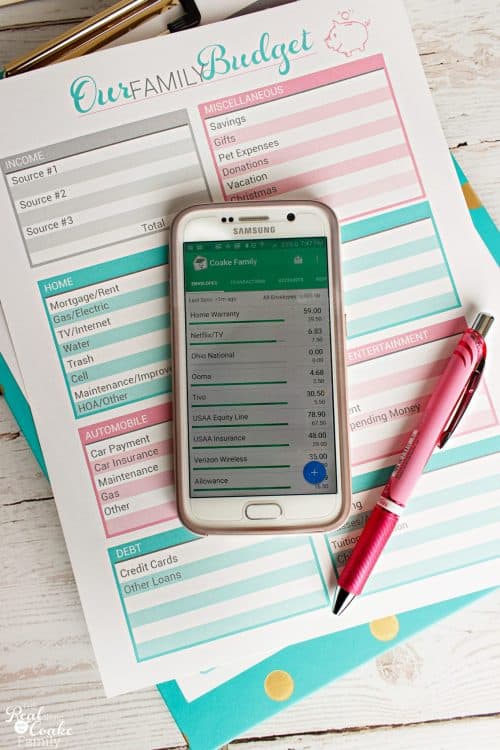
Now, I’ve given you the worksheet at the bottom of the post to keep track of where you are spending your money so you can create a budget. That sheet is meant more for a monthly overview.
You will need to come up with a way to track the daily spending. You can use pen and paper, an Excel spreadsheet, a budget tracking book (affiliate link) or an app. Whatever method you use, you need to make sure that you and your partner are both on board and keeping track of what is spent everyday.
Personally, I LOVE the app Goodbudget. It is how we keep track of our budget. It syncs between my husband iOS and my Android phone. With Goodbudget, I can enter money into the app right when I spend it. It makes it easy to keep track of what we spend. If you use this or an app like it, you will just enter the money and at the end of the month, you can look at a report that will tell you what you spent in each category. That information can be transferred to your planning worksheet.
For Goodbudget, there is a free version that comes with 10 monthly envelopes and 10 yearly envelopes. You can also pay for the upgraded plan which offers unlimited envelopes. It is envelope budgeting if you have heard of that but in a modern form.
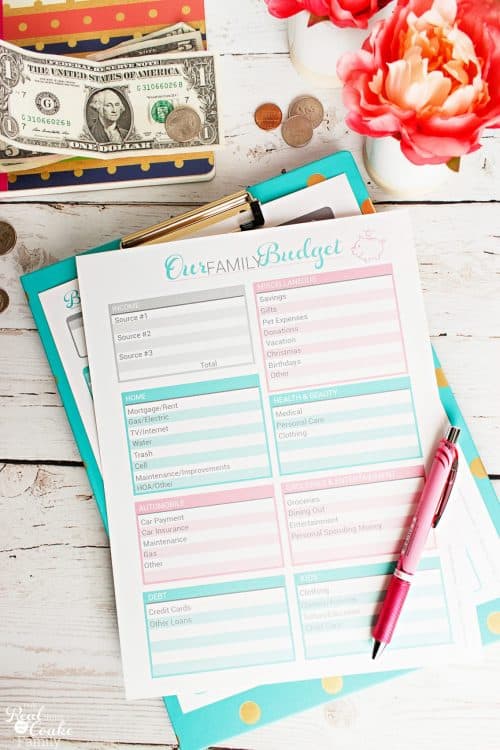
Now that you have tracked your spending for a couple of months before you get to making the actual budget make sure you account for bills that are only paid quarterly or yearly. You don’t want to let those sneak up on you. Then, it is time to make the decisions about what you want your money to do for you. Do you want to take an amazing vacation every year? Save to have an emergency fund? Pay off debt? Save for college or retirement? Pay for a meal delivery service or a maid(sounds dreamy!)? Whatever you want your money to do for you, write it down. Now a lot of those may not be realistic, but write them down. Then decide what is most important.
This is something very personal for you and your partner to decide. It isn’t something I can tell you. I can say that I feel best when we have savings and a cushion as well as when we are contributing to our retirement fund. When we had debt, it has slowed down our repayment of our debt a little bit, but I was OK with that because if my husband lost his job again, I knew we had a cushion. You have to decide what you feel is best for you and your family.
Next, you need to make the numbers work. Sometimes that is the sucky part. That Starbucks habit may have to get cut in half. You may need to pack a lunch for work and have the kids take a lunch to school. If any of those are the case, the organized meal planning and organized grocery shopping posts may be helpful to you.
Be gut level honest with yourself and your partner in this process. Make sure you are both on board with the plan you come up with.
Remember this isn’t set in stone. You can, and should, reevaluate your budget at least once a year, but in the beginning, you may need to tweak it more often than that until it feels like it works for your family.
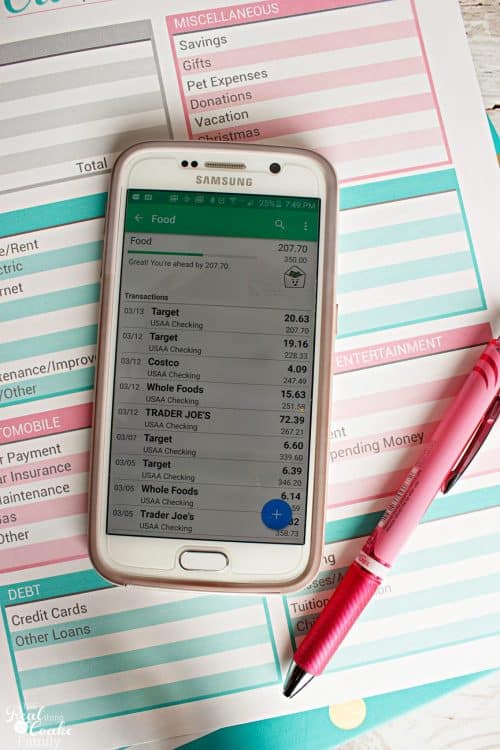
When you have decided on your budget, the second worksheet is the place to put your finalized budget.
If you are using an app that has a budgeting component, you will need to add your budget amounts to your app. You will also need to make sure that you (and your partner) are consistently entering what you spend. It won’t help you keep on track if you don’t enter the info.
That is one of the things I love about Goodbudget. It helps me be totally aware of our money and our budget at any moment. I love that when I’m wandering through Target and I see something I really want for the house or whatever, I can easily pull up my Goodbudget app and see if I have the money or if I need to wait. It usually also makes me think about if I was saving that money up for something else and takes some of that impulse buying out of the picture. Good thing for me!
I also love that each category shows up as either green (showing you have money and are on track) or red (if you are negative in that category).
It also has a little bar that moves based on the day of the month and when you will next fill your envelopes. That movement is to show you if you are spending too fast for that budget period or on track, which is particularly helpful with categories like food where you may need to buy food each week but the envelope won’t be re-filled for 2+ weeks.

Budgeting is actually pretty simple when you get used to it.
I used to think it was this ball and chain to have a budget, but having had a budget for 15 years now, I doubt I will ever live without one again. In my opinion, it frees me up to not worry about bills and money. It gives me limits, which is a good thing. It helps me plan ahead and stay organized so that I don’t have things sneak up on me. It has helped us build a cushion of savings, which bring peace to me.
If you don’t currently have a budget, I would recommend you start one no matter that size of income you have. That was my excuse when we started our budget…we didn’t have enough money to make a budget. We even had a financial planner tell us that! He was totally wrong. I would say that if you are struggling financially, you need a budget even more…even if it is a little depressing. I know. I’ve been there. I also know that during that time of our life, we had no debt and some saving and our budget was the reason we had those things. It certainly can’t hurt for you to give it a try. I promise it won’t bite. 😉
Just sign in below to snag your budgeting planning worksheet and budget sheet.
For those of you who are budgeting pros, what tips do you have to add to what I’ve shared? Leave a comment below. I’d love to learn more.
Hey, do you follow me on Instagram, or Pinterest? If not, why not? You are totally missing out on more fun ideas and cuteness.


Leave a Reply